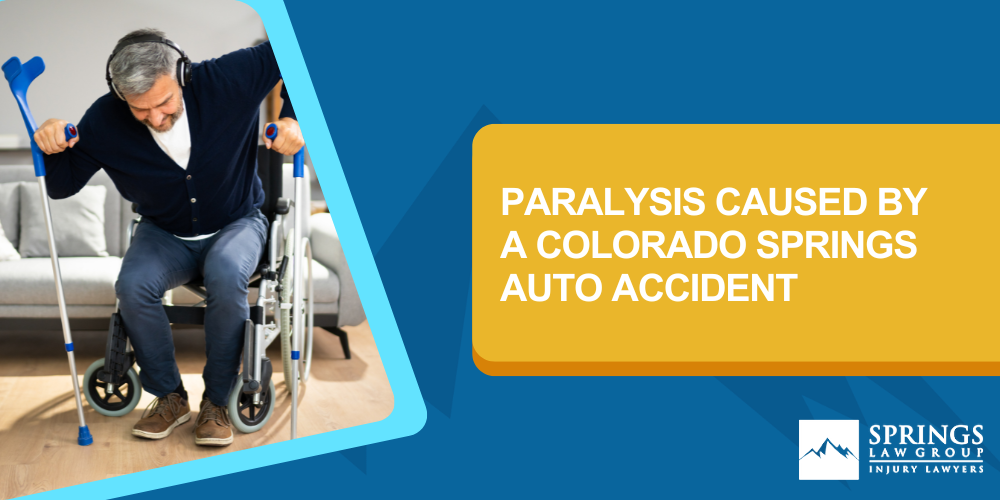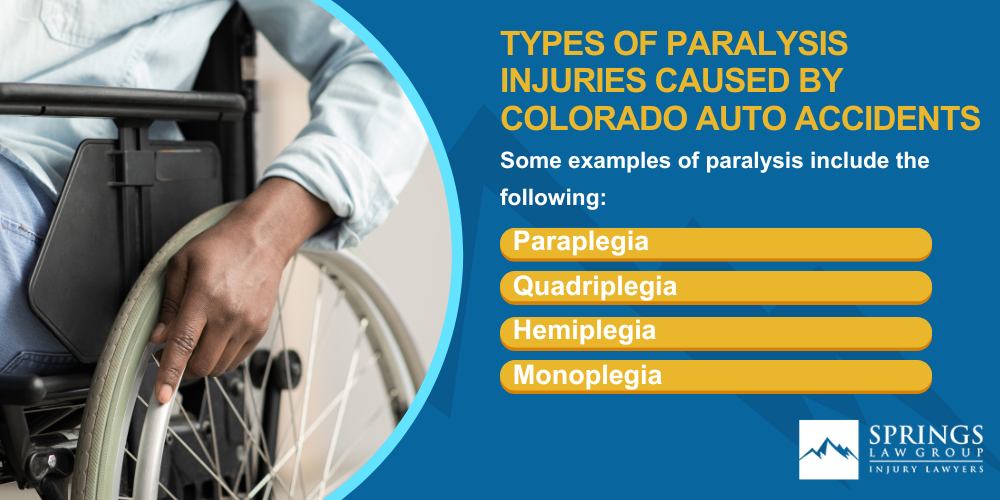Paralysis Caused by a Colorado Springs Auto Accident

The impact of an auto accident can cause damage to vital parts of the human body. Some of the worst injuries are those to the central nervous system (brain and spinal cord) or peripheral nervous system (other out-branching nerves) which affect how a person’s body sends and receives messages. These messages govern sensation like touch, temperature, pressure, moisture, pain, and similar sensations. These messages also govern motor ability, such as the ability to move part of the body by contracting or extending muscles or tendons. When these messages are cut off due to damage to the nervous system, the injuries are known as paralysis injuries.
There can be a wide-variety of paralysis injuries. Some of these injuries can alter a person’s sensation to one side of a finger, or render a person completely unable to move or feel anything from the neck down. But all paralysis injuries require an intricate understanding of medicine. Here at Springs Law Group, our Colorado Springs auto accident lawyers know how to prove both the law and medicine to obtain compensation for our clients in need. Call to learn more by dialing (719) 421-7141.
Types of Paralysis Injuries Caused by Colorado Auto Accidents

Paralysis is the inability to move a part of the body which can be temporary or permanent, partial or complete, and in some way is affected by nerve damage. This paralysis can be for sensation or motor function, and one or both may be affected. Some examples of paralysis include the following:
Paraplegia
Paraplegia is the loss of two limbs, generally below the waist affecting both legs. The paralysis can be partial or complete paralysis of the legs, including either sensation or motor ability, or both. These types of injuries can be caused by a spinal cord injury or traumatic brain injury in a car crash.
Quadriplegia
Quadriplegia is paralysis below the neck affecting all four limbs and possibly the torso. This can also be partial or complete paralysis, and affect both sensation or motor ability. After a car accident, a quadriplegic injury may be the most debilitating type of injury because a victim may no longer be able to care for himself or herself without assistance, may be unable to work, and may require extensive medical care and treatment.
Hemiplegia
Hemiplegia is paralysis to one side of the body, such as all the limbs on the left side or all limbs on the right side. Hemiplegic injuries are likely caused by traumatic brain injuries in auto accidents that damage a certain hemisphere of the brain that governs that movement.
Monoplegia
Monoplegia is paralysis of one limb or part of the body, such as an arm or leg. This can be caused in a motor vehicle wreck when one limb was injured. The nerves could be injured and shut off the limb’s power to sense or move, such as the brachial plexus which is the bundle of nerves originating from the spine and extending through the shoulder and down the arm. These injuries are most likely due to direct and acute trauma of a limb or area of nerves.
Call Our Colorado Springs Auto Accident Lawyers for Paralysis Injuries Caused by Another’s Negligence

When a victim of a car collision suffers serious and debilitating personal injuries that cause any kind of paralysis, he or she may be entitled to compensation for his or her injuries, medical bills, lost wages, lost future earnings, property damage, and other expenses.
